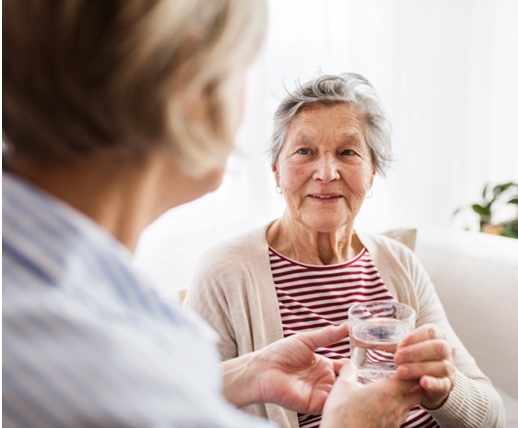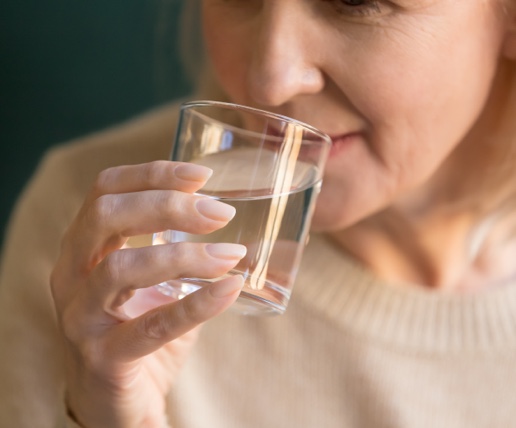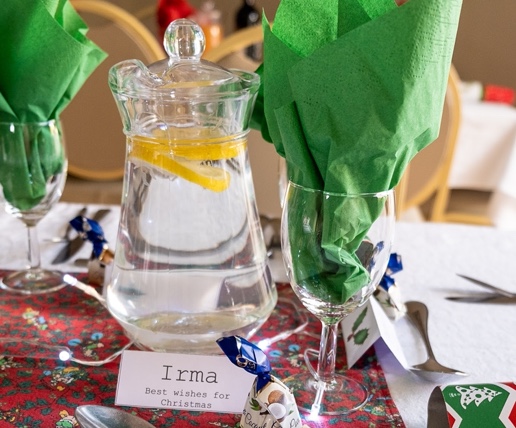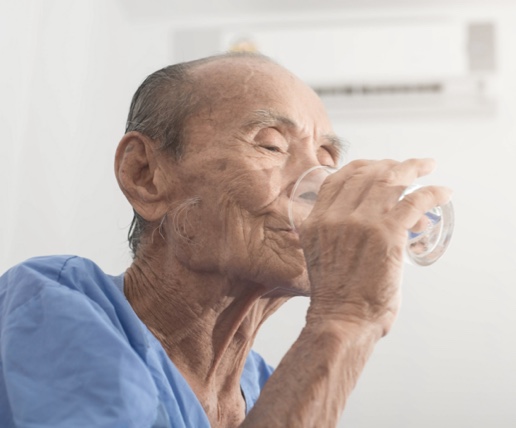
Up to 60% of the human adult body is made up of water. So it’s no surprise that being dehydrated is detrimental to your health. Not only are seniors in particular at high risk of dehydration, they also suffer the most severe consequences. The good news is that there are easy ways to avoid dehydration and lower the risks associated with it. Let’s take a look at some of the signs, symptoms and solutions to dehydration in seniors.



1. The importance of staying hydrated
Water is essential for many of the bodily functions, including temperature regulation, waste elimination, joint lubrication, delivery of nutrients, blood circulation, skin hydration and even brain function. When dehydrated, the body does not have enough fluids to complete these functions efficiently.
Water is essential for many of the bodily functions, including temperature regulation, waste elimination, joint lubrication, delivery of nutrients, blood circulation, skin hydration and even brain function. When dehydrated, the body does not have enough fluids to complete these functions efficiently.
2. Seniors are more prone to dehydration
Seniors tend to drink less water, on average, than younger people. This can be due to a number of health and lifestyle conditions. As the body ages, the kidneys become less efficient, which results in a lower percentage water content in the body. The feeling of thirst that usually comes with dehydration also declines, meaning seniors often don’t even know that they are thirsty. Some medications also cause lack of thirst. Seniors who suffer from dementia may forget to ask carers for water, while others with physical ailments such as a stroke may have trouble swallowing. Some medications can result in seniors having to urinate more often, which can also lead to dehydration. Medical conditions such as diarrhoea, fever and diabetes also contribute to lower fluid levels.
Seniors tend to drink less water, on average, than younger people. This can be due to a number of health and lifestyle conditions. As the body ages, the kidneys become less efficient, which results in a lower percentage water content in the body. The feeling of thirst that usually comes with dehydration also declines, meaning seniors often don’t even know that they are thirsty. Some medications also cause lack of thirst. Seniors who suffer from dementia may forget to ask carers for water, while others with physical ailments such as a stroke may have trouble swallowing. Some medications can result in seniors having to urinate more often, which can also lead to dehydration. Medical conditions such as diarrhoea, fever and diabetes also contribute to lower fluid levels.
3. The signs of dehydration in seniors
The first signs of dehydration are usually mild and can include cracked lips, dry mouth and skin, as well as less frequent urination. These symptoms can progress quickly though. The next stage of symptoms includes dark or strong-smelling urine, dizziness, increased heart rate, muscle cramps, fatigue, irritability, headaches, confusion and crying without tears. It must be noted however that some of these symptoms can be caused by other factors, such as certain medications and cognitive decline. A good rule of thumb is for seniors to have a drink of water and see if symptoms improve shortly thereafter. However, the most reliable way to ascertain dehydration is with a blood test.
The first signs of dehydration are usually mild and can include cracked lips, dry mouth and skin, as well as less frequent urination. These symptoms can progress quickly though. The next stage of symptoms includes dark or strong-smelling urine, dizziness, increased heart rate, muscle cramps, fatigue, irritability, headaches, confusion and crying without tears. It must be noted however that some of these symptoms can be caused by other factors, such as certain medications and cognitive decline. A good rule of thumb is for seniors to have a drink of water and see if symptoms improve shortly thereafter. However, the most reliable way to ascertain dehydration is with a blood test.
4. Treatment for dehydration
The treatment and time required for recovery from dehydration in seniors depends on how severe the dehydration is, as well as their general health. If a senior is showing signs of dehydration, the obvious and most important step is for them to drink a glass of water immediately. If the symptoms persist, heading to the emergency room or calling a doctor is essential. They may be given fluids that contain electrolytes, or if more serious, an IV drip. If a senior’s kidneys are affected, dialysis might also be necessary.
The treatment and time required for recovery from dehydration in seniors depends on how severe the dehydration is, as well as their general health. If a senior is showing signs of dehydration, the obvious and most important step is for them to drink a glass of water immediately. If the symptoms persist, heading to the emergency room or calling a doctor is essential. They may be given fluids that contain electrolytes, or if more serious, an IV drip. If a senior’s kidneys are affected, dialysis might also be necessary.
5. The best ways to avoid dehydration
While the traditional rule of thumb is to drink eight glasses of water a day, this can be difficult to ensure. If seniors are forgetting to drink water, there are some handy apps that provide reminders throughout the day. Adding water to daily routines, such as drinking a full glass of water after brushing teeth is a good habit to get into. For seniors who don’t enjoy drinking water, adding some fruit juice or sparkling water can help make the flavour more interesting. Remember that most foods contain water, so vegetables, fruits and soup are good options too.
While the traditional rule of thumb is to drink eight glasses of water a day, this can be difficult to ensure. If seniors are forgetting to drink water, there are some handy apps that provide reminders throughout the day. Adding water to daily routines, such as drinking a full glass of water after brushing teeth is a good habit to get into. For seniors who don’t enjoy drinking water, adding some fruit juice or sparkling water can help make the flavour more interesting. Remember that most foods contain water, so vegetables, fruits and soup are good options too.
At Totalcare, we offer eight all-inclusive retirement villages complete with everything residents need for a healthy lifestyle. Our dedicated dieticians prepare fresh seasonal menus featuring nutritionally balanced meals prepared according to the specific needs of seniors. Our nurses and care staff understand the signs and symptoms of dehydration and are equipped to treat them immediately. Residents also have access to a doctor, occupational therapist and support services to administer any medical care required.
For more information, click here.
For more information, click here.
